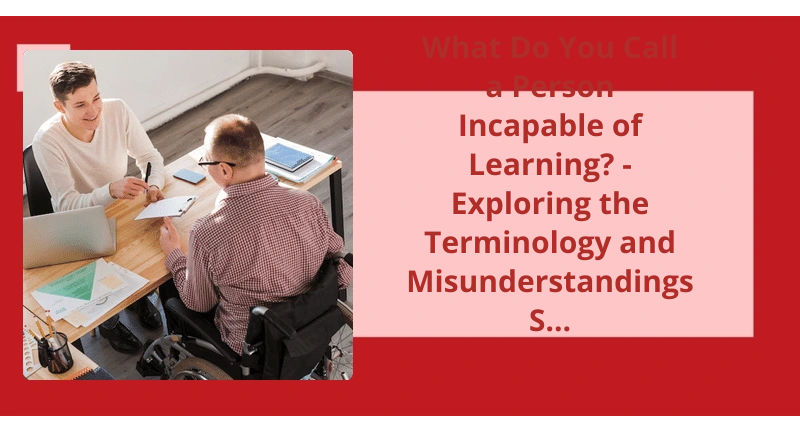Intellectual disability is a complex neurodevelopmental condition that affects millions of people worldwide. This condition is characterized by a wide range of difficulties in intellectual and adaptive functioning that can limit an individual's ability to learn and achieve independence. Those living with ID may struggle with various aspects of daily life such as communication, social interaction, and self-care. Despite the challenges faced by those with ID, with the right interventions and support, they can live full and meaningful lives.
What Do You Call a Person Who Doesn’t Learn?
A person who doesn’t learn is generally referred to as being ignorant. This term is often used to describe someone who’s little knowledge or understanding of a specific subject or field. Being ignorant doesn’t necessarily mean that a person is unintelligent, but rather that they haven’t taken the time to learn about a particular topic.
Illiterate, unlettered, and uneducated are also terms that are often used to describe someone who doesn’t learn. An illiterate person is someone who can’t read or write. This makes it difficult for them to learn and acquire knowledge, as reading and writing are fundamental skills required for most forms of education.
Likewise, an unlettered person is someone who hasn’t received a formal education. This individual may be lacking in knowledge or skills that are typically taught in schools or colleges. Such individuals may struggle to understand complex ideas or concepts, and may have difficulty acquiring new knowledge.
Finally, an uneducated person is someone who hasn’t had the opportunity to receive an education. This may be due to a lack of resources in their community, financial constraints, or personal circumstances. Regardless of the reason, uneducated individuals may find it difficult to succeed in todays highly competitive job market.
Learning Disabilities and How They Affect Individuals
Learning disabilities are conditions that affect a person’s ability to acquire, use, and/or apply skills and knowledge. These disabilities can have a profound impact on the individual’s academic, social, and emotional development. Some common learning disabilities include dyslexia, dysgraphia, and ADHD. While these conditions can’t be cured, individuals can learn strategies and accommodations to help them overcome challenges and achieve success.
It’s important to expand one’s vocabulary and understanding of language, especially when it comes to expressing ideas and concepts. In this article, we will explore various synonyms for the phrase “lack of knowledge and skills” to help broaden your lexicon. These alternative words and phrases may better convey your intended meaning and help you communicate effectively.
What Is a Synonym for Lack of Knowledge and Skills?
Lack of knowledge and skills is a term that’s used to describe a situation where an individual lacks the necessary understanding or abilities to engage in a particular activity or task. It can refer to both cognitive and practical skills, such as reading, writing, problem-solving, and decision-making.
One synonym for lack of knowledge and skills is backwardness. This term suggests a lack of progress or development, particularly in relation to intellectual or cultural advancement. It’s often used to describe individuals or societies that are perceived as being behind the times or out of touch with contemporary ways of thinking and living.
It may refer to a lack of access to education or to poor quality education that fails to equip individuals with the knowledge and skills they need to succeed in life.
Nescience is another synonym for lack of knowledge and skills, which refers to a state of ignorance or unawareness. Nescience can be a significant barrier to personal and professional growth, as well as to social and political engagement.
Finally, unenlightenment is another synonym for lack of knowledge and skills, which suggests a lack of intellectual or cultural enlightenment. It can refer to a narrow-minded or uncritical approach to life, which is characterized by a lack of curiosity, ambition, or creativity. Unenlightenment is often associated with conservatism, traditionalism, and resistance to change or progress.
The Impact of Lack of Knowledge and Skills on Personal and Professional Development
Lack of knowledge and skills can have a negative impact on personal and professional growth. This can lead to missed opportunities, increased stress and reduced productivity. It’s important to continuously learn and develop skills to stay relevant in a constantly evolving world.
There are times when we encounter something that we can’t fathom no matter how much we try to comprehend it. In fact, there’s a word for that – incomprehension. It’s a condition where an individual can’t understand something no matter how hard they try. In this article, we’ll explore the various aspects of incomprehension and it’s effects on human psychology and behavior.
What’s a Word for Lack of Understanding?
Incomprehension is a noun that refers to the condition of not being able to understand. It’s often used to describe a lack of understanding or a failure to grasp a concept or idea. This can be caused by a variety of factors, including a lack of information or experience, a language barrier, or cognitive limitations.
It can lead to miscommunication, misunderstandings, and even conflict if not addressed and resolved. In many cases, those who experience incomprehension may feel embarrassed or self-conscious about their lack of understanding, which can further hinder communication efforts.
For example, individuals with certain learning or cognitive disorders may struggle with incomprehension on a regular basis, even in areas where they’ve significant experience or knowledge.
To address incomprehension, it may be necessary to adjust communication strategies or provide additional information or support. This could include breaking down complex concepts into smaller, more digestible pieces, using visuals or examples to illustrate key points, or finding alternative methods of communication, such as using written materials or translation services.
However, by acknowledging and addressing the issue with patience, flexibility, and an open mind, effective communication and understanding can still be achieved.
Practical Exercises or Activities That Can Help Build Comprehension Skills and Reduce Misunderstandings.
- Reading comprehension exercises that involve analyzing the main idea and supporting details
- Question and answer exercises that test understanding of specific details or concepts
- Summarizing exercises where the main idea of a passage or article is condensed into a few sentences
- Group discussions or debates where participants must listen and respond to each other’s perspectives
- Visual aids, such as diagrams or charts, that can help illustrate complex ideas or relationships
- Role-playing or scenario-based exercises that require participants to interpret and respond to different situations
- Critical thinking exercises that challenge participants to analyze and evaluate information before reaching conclusions
- Problem-solving exercises that require participants to work together to identify and resolve issues
Now that we’ve established some synonyms for the lack of competence, it’s important to understand how this can impact various aspects of life. Whether it’s in the workplace, in relationships, or just personal goals, incompetence can have significant consequences. In the next section, we’ll explore some of these effects and how to overcome them.
What Is a Synonym for Lack of Competent?
It’s not uncommon for individuals to experience a lack of competence in certain areas of their life. This could be due to a variety of factors including lack of experience, training, or knowledge. A synonym for lack of competence is “incompetence,” which is defined as the inability to do something properly or effectively.
One factor that can contribute to incompetence is a lack of proper training. For example, someone who’s never been taught how to use a specific software program may not be competent in using it. Similarly, a person who’s never been trained in a particular skill or technique may not be competent in performing it.
This is especially true for jobs or tasks that require a certain level of expertise. For example, a new doctor may not be as competent as a doctor who’s been practicing for many years.
If someone isn’t motivated to learn or improve, they may not be able to achieve the level of competence required for a particular task or job.
While some people may be naturally gifted in certain areas, others may struggle to develop the skills and knowledge necessary to perform at a high level.
Overall, it’s important to recognize when you’re lacking competence in a particular area and take steps to improve. This could involve seeking out training, gaining experience, or finding ways to increase motivation and develop new skills. By doing so, you can become more competent and increase your chances of success in both your professional and personal life.
It’s a question that’s long fascinated scientists and educators alike: are we all born with the same capacity to learn and grow? While it’s true that every person has the potential to develop new skills and knowledge, the reality is that some individuals may face greater challenges or limitations than others. In this article, we’ll explore the complex interplay between biology, environment, and individual differences in learning capability.
Are All Humans Capable of Learning?
When it comes to learning, there are a number of factors at play. These can include individual learning styles, cognitive ability, cultural background, and even socio-economic status. However, while there may be differences in these factors, it’s generally believed that all humans are capable of learning to some extent.
One of the key drivers of this belief is the fact that humans are born with a highly adaptable brain. Throughout childhood and adolescence, the brain is constantly developing and making new connections. This ability to adapt is what allows us to learn new languages, develop new skills, and acquire knowledge about the world around us.
However, it’s also important to acknowledge that individual differences in capability can have a significant impact on learning. For example, someone with a learning disability may require more specialized support in order to learn new information effectively. Similarly, someone with a lower IQ may have more difficulty grasping complex concepts than someone with a higher IQ.
Despite these differences, it’s worth noting that there are also a number of universal factors that can help facilitate learning for everyone. These can include things like setting clear goals, breaking down complex concepts into more manageable pieces, and providing positive reinforcement for progress and achievement.
At the end of the day, while there may be variation in terms of individual capability, all humans have the capacity to learn and grow. With the right approach and support, anyone can acquire new knowledge and develop new skills – it may just require different strategies or tools for different people.
The Role of Motivation in Learning: Exploring How Intrinsic and Extrinsic Motivation Can Impact Learning Outcomes.
- Introduction to motivation in learning
- Definition of motivation
- Intrinsic motivation – what it’s and how it impacts learning outcomes
- Extrinsic motivation – what it’s and how it impacts learning outcomes
- The relationship between intrinsic and extrinsic motivation in learning
- How to encourage intrinsic motivation in the classroom
- How to balance intrinsic and extrinsic motivation in the classroom
- The importance of motivation in online learning
- Conclusion: Motivation as a key factor in learning outcomes
Conclusion
In conclusion, individuals with intellectual disability require our understanding, support and patience. They face many challenges that can significantly impact their daily life and ability to learn. It's important to recognize that these individuals have unique strengths and abilities that make valuable contributions to our communities. By providing appropriate resources and accommodations, we can help them achieve their full potential and live fulfilling lives. While the term "mental retardation" has been replaced by "intellectual disability" in recent years, it's important to continue to challenge negative stereotypes and stigma associated with this condition. Instead, we should focus on promoting inclusivity and creating a world that values the diversity of all individuals, regardless of their abilities.





